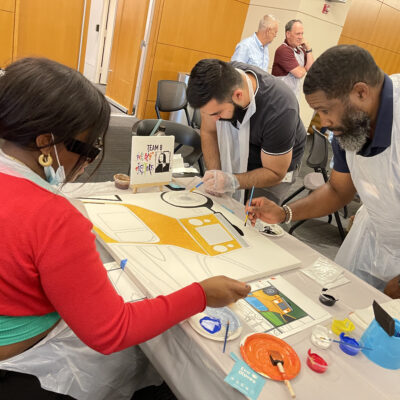Team-oriented employees are essential to any workplace. They’re often more engaged, productive, and may have higher morale than those who aren’t. These team players help keep teams together, drive teamwork, and invigorate the workplace.
Team-oriented individuals also help improve the overall company culture, which has its own list of benefits.
Being team-oriented, meaning that you put the well-being of the team first, is all about focusing on the whole. Team-oriented individuals focus on the team and its goals, putting their effort towards the team instead of themselves. And as you’ll soon find out, they are essential for any successful workplace.
In this article, we’ll explore what it means to be team-oriented. We’ll examine common characteristics of team-focused individuals, the benefits of a team-oriented culture, how to build a team-oriented environment, and some tips to help foster it.
How to Define Team-Oriented
Let’s start by looking at some basics, beginning with the team-oriented definition. A simple definition of team-oriented is “working within a team and focusing on the team’s well-being.”
What does that mean in the real world, though? In practice, being teamwork-oriented means prioritizing the team as a whole over yourself.
Prioritizing Yourself vs Being Team-Focused
Say you’re working on a project alongside someone you have some disagreements with.
If you aren’t a team player, you might let your own passions and ego take over, resulting in arguments and disagreements with that person. This could quickly spiral into bigger drama amongst the team.
If you’re a team player, however, you’d handle this situation differently. Instead of letting your emotions get the better of you, you’d do your best to make it work.
You might try to focus on the actual work, come to a compromise, and figure out how you can work together to accomplish your goals as a team despite any disagreements. This is just one example, but at the end of the day, team-oriented individuals ultimately put the team and its well-being first.
Team-Focused Characteristics
Going further, let’s look at a few characteristics of team-focused individuals.
One of the first things you’ll notice is that they’re great at collaboration and communication. They’re able to communicate clearly and effectively with their coworkers, working together well to accomplish their goals.
They understand the importance of communication, and they use it to drive their collaborations.
Another characteristic is flexibility and adaptability. As we all know, things rarely seem to go as planned. That’s even more true when you’re working with teams. Things happen, plans change, and you need to be flexible.
Team-oriented people know that adapting to changes is important for the well-being of the team, so they do their best to “go with the flow” and stay focused on what really matters—the team as a whole.
Lastly, team-oriented workers are usually positive and supportive. We all require some positivity and support from time to time, and it’s an important part of maintaining a healthy environment. Those who are team-oriented try to support those around them and stay positive, uplifting the entire team.
Benefits of Team-Oriented Culture
Now, let’s look at why team-oriented characteristics are so highly valued. There are many benefits of having a team-oriented culture and understanding those benefits will make it easier for you to create the culture you want.
Productivity and Accomplishments
One of the biggest benefits, especially from a business perspective, is the increased productivity. It shouldn’t come as a shock that teams that are healthy, supportive, and focused on the overall team tend to do better.
When everyone is working together and placing an emphasis on the team’s well-being, they are more productive. They work better together and get more accomplished, which is good for them personally and the bottom line.
Innovation and Creativity
Another big benefit is enhanced creativity and innovation. Again, it makes sense that a team working together to support one another ends up being more creative and innovative.
Innovation and creativity often rely on people coming together, using each other’s strengths, and creating something none of them could have individually. A team that can work together well and collaborate can do wonders for creativity.
Employee Satisfaction and Retention
The last benefit we’ll list here is improved employee satisfaction and retention, but it’s a pretty important one. Creating a team-oriented culture helps create a better work culture overall. That in and of itself has numerous benefits.
With a positive culture, employees feel better. They’re less burnt out, less stressed, more engaged, energized, and productive. At the end of the day, a positive culture means happier employees and better work, which is a big benefit for any business.
That also means improved employee satisfaction and retention. Employees feel like they matter, are part of something bigger, and are supported by those around them. That makes them feel more satisfied with work, resulting in better output.
On top of that, it also means higher retention rates since employees won’t feel the need to leave and go elsewhere.
How To Build a Team-Oriented Environment
Next, the question is, “How do you build a team-oriented environment?” Though it’s a simple question, there are a lot of different aspects to cover. So, let’s look at the basics of creating a teamwork-oriented environment.
Start at the Top
First and foremost, leaders need to show employees what being team-oriented really means. People follow by example, and they won’t be team-oriented if their leaders aren’t. That means leaders need to prioritize a teamwork focus in their own behavior.
There are lots of ways leaders can start putting the team and its well-being first. Team-oriented leaders need to communicate clearly and effectively.
Communicate Effectively
Talk to your employees about what’s going on, ask how you can help or support them, and be honest. Give employees the chance to talk to you directly and listen to their concerns or input. Active listening and straightforward communication are key here.
Trust Your Team
Team-oriented leaders also need to know their teams well. Everyone has strengths and weaknesses. Good leaders know those well, and they use that knowledge to make decisions that benefit the team and its well-being. Above all else, be open-minded and trust your team when you talk to them.
Celebrate Success
You should also make sure your employees feel valued and cared about. Celebrate their successes, and make it a point to acknowledge their hard work.
Consider rewards for big victories or accomplishments—they can go a long way in showing how much you care about the team and their successes.
How To Get Your Team Involved
If leaders are doing all of the things we discussed above—communicating effectively, trusting those around them, and acknowledging successes—it’s possible to create a team-oriented environment. But… Employees and team members have a responsibility, too!
Employees need to do all of those things as well. They need to communicate, build connections, trust each other, celebrate their wins, and put the team first. It gets easier when a leader is doing all of these things, too, but it can still be a struggle.
Team building can be a good solution. With team building, you can focus on team-oriented skills like communication and trust, helping better those skills for the whole team.
Breaking Barriers
Breaking Barriers is a fun, karate-based event where teams overcome their self-imposed limitations. They’ll focus on motivation, confidence, and leaving their comfort zones.
Using a board to symbolize the insecurities that hold them back and the goals they want to achieve, this event encourages your team to (literally) smash through barriers and obstacles on their way toward success. It’s an exhilarating and transformative process that guides participants on a journey of deep insights and impactful results together.
Team Teddy Rescue Bear
Team Teddy Rescue Bear gets team members working together as they create teddy bears for those in need. It emphasizes teamwork, creativity, and looking at the bigger picture.
In this heartwarming charitable activity, your entire group pitches in to spread kindness and love to children in need. Your team members will work together to solve puzzles, decipher codes, and unravel secrets to earn points. Then, they’ll redeem these points for high-quality teddy bear parts.
This creative process continues as teams add outfits and accessories to give each bear its own huggable personality. In doing so, it creates a sense of purpose and unity among team members.
Do Good Bus
With the Do Good Bus, your team will head out for a day of volunteering, fun, and community engagement. They won’t know their destination until they arrive, which means they’ll experience the shared excitement of surprise while working together.
The bonus is that they’ll be working together to support either environmental or people-focused causes in their community. This activity emphasizes flexibility, cooperation, and the shared satisfaction of giving back.
If you want to help everyone feel extra engaged in this event, consider asking them about causes they’d like to support beforehand.
Tips for Individuals To Foster Team-Oriented Behavior
Finally, let’s touch on ways that you can foster a team-focused culture. Creating a team-oriented workplace can be tough, but these tips should help make it a little easier.
Focus On Communication and Listening
One of the most important aspects is to focus on communication. It’s impossible to create a team-oriented culture without having good communication, so it’s something you need to emphasize. Practice active listening, make sure everyone has the chance to be heard, and take peoples’ input and concerns seriously.
Develop Teamwork Skills
Another excellent approach is to develop teamwork skills. As you’d expect by now, teamwork is essential if you want to be team-oriented. Take the time to help people bolster their teamwork skills. Consider exercises, activities, team building, and more to help improve teamwork.
Encourage Collaboration
Try to encourage and embrace a collaborative mindset. Let people work together, pool their talents, and work as teams. Again, exercises, activities, and team building exercises can be a great resource for encouraging a collaborative mindset.
This is another place where leaders need to lead by example. Show your teams that you are willing to work together with them and be a team player.
Focus On Your Team with TeamBonding
A team-oriented culture is essential if you want your team members and workplace to be at their best.
When people are team-oriented, they put the team and its well-being first. And in turn, that results in numerous benefits such as increased productivity, creativity, innovation, retention, satisfaction, and more.
Creating a team-oriented culture may seem difficult, but it is achievable. Leading by example, focusing on team-oriented skills, and valuing your team members and coworkers can help create a team-oriented workplace that uplifts everyone.
If you’re ready to put a focus on your team, consider TeamBonding. We have over 20 years of experience putting together corporate events, and we have a multitude of events perfect for focusing on team orientation. So take action and get in touch today!
















